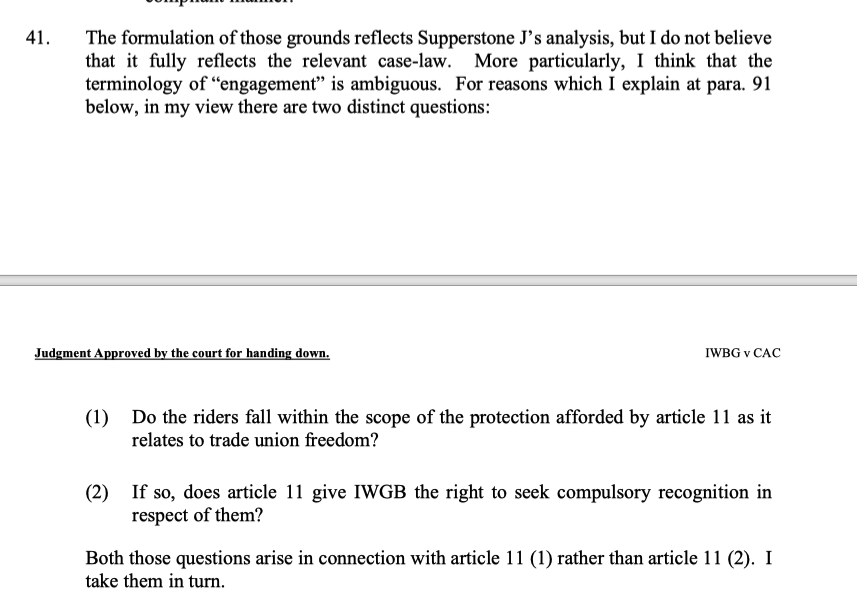1/ The CA has found Deliveroo drivers aren't workers. That may surprise close followers of Uber, but the main reason is that this appeal was about the scope of Art 11 ECHR & personal service, neither of which were features of the Uber judgment. bailii.org/ew/cases/EWCA/…
#ukemplaw
#ukemplaw
2/ The case concerned collective bargaining rights, with the IWGB applying to the CAC to be recognised by Deliveroo for collective bargaining purposes in the Camden & Kentish Town food delivery zone. The CAC found the drivers weren't workers & the CA agree.
3/ The relevant definition of 'worker' is that under s.296(1) TULR(C)A, which is similar though not identical to that under the ERA. 

4/ Deliveroo riders are engaged under a standard supplier agreement. Once entered into, riders download an app allowing them to indicate when they're available to be offered work in a zone in which they are registered.
5/ Whilst there's no obligation to be available at any time or for any duration, those logged on will be offered jobs based on proximity to the point of collection. The driver has 3 minutes to accept but no obligation to do so. If they accept, they collect & deliver the food.
6/ The suppliers agreement permits riders to use substitutes. The permission is fairly wide save for the need to ensure the substitute can lawfully work in the UK, has no unspent convictions, can be tracked by Deliveroo GPS & hasn't had a terminated Deliveroo supplier agreement. 

7/ The CAC recognised that the ability to substitute wasn't policed (albeit it was used rarely), & the lack of penalty for not logging on or accepting orders, but that it was speed of delivery instead which could lead to termination of contract. 

8/ The CAC conclude that the substitution right was genuine & that the riders were thus not workers. They also (in very brief terms) dismissed an argument that Art 11 ECHR ought to have led to a different conclusion. 

9/ IWGB sought to judicially review the CAC decision. Permission was only given on 1 ground - that the CAC failed properly to address the A11 point. Importantly therefore, there was no challenge to the CAC's conclusion as a matter of domestic law. 

10/ At the JR, the court held A11 wasn't engaged. That decision was the subject of this appeal. The CA held there were 2 questions to answer: (i) are riders within A11's scope re trade union freedom; (ii) If so, does A11 give IWGB the right to seek compulsory recognition? 

11/ On (i), the CA started with the Good Shepherd case (re Romanian Orthodox priests), noting that the ECtHR found A11 applicable re trade union freedom only where there's an employment relationship as defined in light of ILO R198 (the pertinent part of which is pasted below) 



12/ IWGB disagreed with the Good Shepherd approach, submitting that A11 applies to everyone & couldn't be restricted to a particular class of person. The CA disagreed, preferring the approach in Good Shepherd to a more ellipitical & befuddled approach in the later case of Manole. 

13/ The CA noted ILO R198 left to member states to prescribe how to identify an employment relationship, whilst offering some guidance in paras 11-13. This didn't mean the court should apply the domestic provisions on status. The court had to make the choices the ILO left open. 

14/ The CA kept in mind from the ILO recommendation that it regarded subordination/dependence essential to an employment relationship, that the specific indicators should be considered cumulatively & that states should look out for efforts to disguise employment relationships. 

15/ Absent ECHR authority on dealing with an app based relationship & questions of status, the CA turned to the CJEU decision in the delivery driver case of B v Yodel, which it read across favourably to Deliveroo as against its riders. 

16/ Underhill LJ considered CJEU case law gave "some" indication of the likely approach under the ECHR. No other case law is expressly considered on the likely Strasbourg approach.
17/ That approach nevertheless informed the CA's conclusion that the CAC was entitled to find the riders weren't in an employment relationship with Deliveroo for A11 purposes. Key was the genuine right to substitute/lack of obligation to provide services personally.
18/ The CA concluded in particular that ILO R198 para 13 recommends as a specific indicator of an employment relationship that the work "must be carried out personally by the worker". The CAC were entitled to consider its lack decisive. 

19/ In a footnote (where some of the best parts of his judgments are), Underhill LJ describes as 'ticklish' the scope of the concept of subordination & the relevance to it of substitution clauses precluding a requirement to provide services personally. 

20/ @MichaelFordQC has already put out a brief thread on this particular aspect of the judgment. I can't better him, so here's the link:
https://twitter.com/MichaelFordQC/status/1408053797016965120
@MichaelFordQC For those who've not already found it, here's the 2nd part of the Deliveroo thread, which mysteriously parted from the 1st part:
https://twitter.com/JasonBraier/status/1408076810080956419
• • •
Missing some Tweet in this thread? You can try to
force a refresh








